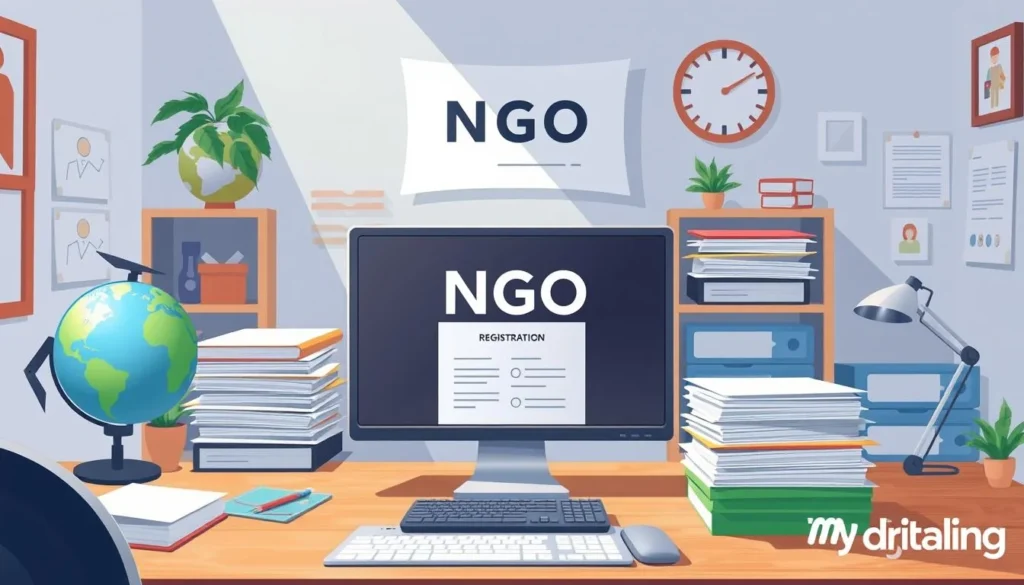
Starting a non-profit? Then Darpan NGO registration is the first major step. It is essential for gaining government support and grants. It also builds credibility. I work with NGO Experts, a legal company that provides full assistance in this area. Let me explain everything you need to know about registering your NGO on the Darpan portal.
What is Darpan NGO Registration?
The Darpan Portal is a digital platform created by NITI Aayog. It connects non-profits with various ministries. It’s a requirement if I want to apply for government grants. Without this registration, no NGO can receive central government funding.
This portal records basic NGO details such as PAN, registration proof, and objectives. It helps ensure transparency. When I register here, I get a Unique ID which is mandatory for many legal procedures.
Why I Consider Darpan NGO Registration Important
I consider Darpan registration a foundation for building my NGO’s reputation. It allows me to:
- Gain access to government schemes
- Apply for CSR projects
- Maintain legal compliance
- Improve accountability
This registration is not just a formality. It is a strong step towards formal recognition by the Indian government.
Required Documents for Darpan Registration
For a smooth registration of non governmental organization on the Darpan portal, I always keep the following documents ready:
- PAN card of the NGO
- Registration Certificate (Trust, Society, or Section 8)
- Copy of the Memorandum of Association (MoA) or Trust Deed
- Details of key office bearers
- Email ID and Mobile Number
- Bank account details
All scanned documents must be clear and in PDF format. These are required to complete the profile and obtain the Unique ID.
Step-by-Step Procedure I Follow for Darpan NGO Registration
Here is the simple process I follow when registering an NGO on the portal:
Step 1: Visit the Portal
I go to the official NGO Darpan portal .
Step 2: Sign-Up
I use my email ID and mobile number to create an account. A one-time password (OTP) helps verify the contact details.
Step 3: Fill in the Details
After signing in, I enter the NGO’s information. That includes name, address, and type of organization. I also add details of board members.
Step 4: Upload Documents
I upload scanned copies of the registration certificate and PAN card. These documents must match the information I enter in the form.
Step 5: Submit and Get the Unique ID
Once everything is entered correctly, I submit the form. After verification, I receive a Unique ID. This number is essential for future dealings with government bodies.
Darpan Registration and Income Tax Filing Connection
One major benefit of having a Darpan NGO registration is the ability to apply for tax exemptions. After registration, I can apply for 12A and 80G certificates. These allow donors to claim deductions, and the NGO itself to become tax-exempt.
However, I must regularly complete Income Tax Filing for the NGO. Filing returns on time keeps the registration valid. At NGO Experts, we ensure that both your registration and tax compliance go hand-in-hand.
How NGO Experts Supports Darpan Registration
At NGO Experts, we specialize in legal and compliance services. I help NGOs like yours with:
- Profile creation
- Document verification
- Online application
- Government correspondence
- Tax planning and Income Tax Filing
We make sure every step is correct. A small error in PAN or registration details can delay your approval. That’s why I recommend using expert help.
Common Mistakes I Avoid During Registration
Over time, I have seen many NGOs make common mistakes. Here’s what I avoid:
- Using expired registration certificates
- Not updating board member details
- Submitting low-quality scanned documents
- Incorrect PAN or mismatch in legal names
Each of these issues leads to rejections or long delays. I double-check every detail before submission.
After Darpan Registration: What Comes Next?
Getting the Darpan NGO registration is not the end. I also focus on these steps:
- Applying for 12A and 80G
- Completing FCRA registration (if foreign funds are required)
- Filing annual Income Tax returns
- Updating Darpan profile when office bearers change
A Darpan ID brings recognition, but it also brings responsibility. I maintain my NGO’s data and tax compliance regularly.
Conclusion
If you’re serious about social impact, start with proper legal steps. Darpan NGO registration builds the base for all government and CSR collaborations. It proves your NGO’s legitimacy.
At NGO Experts, I provide step-by-step guidance, not just for registration but also for long-term compliance. With my support, you don’t just register your NGO — you make it sustainable, visible, and trusted.
Let’s make your NGO legally strong and ready for growth.





